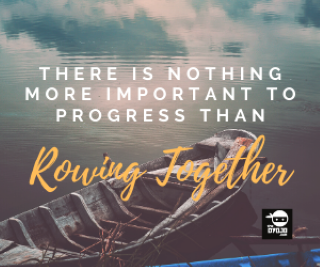When we are not operating according to our vision, we allow office drama to sink our boat. What are your thoughts on office drama? Is it inevitable? Is it preventable? Do you enjoy hearing the latest gossip? Are you actively fanning the flames? Whether you have put much thought into it or not, office drama is costly. A study in 2008 discovered that employees in the United States spent 2.8 hours per week dealing with conflict which CPP estimated as costing over $359 billion in paid hours or the equivalent of 385 million working days. Are you still a fan (or bystander) of drama in your office?
What is that costing you if each of your employees is spending 2.8 hours or 7 % of their 40 hour work week on office drama? Our organization is a boat. We want our team members rowing together. We want to move water with our oars not be taking water into our boat. Office drama causes leaksThe calculation above doesn’t even account for the collateral damage related to the fallout from office drama. What would you gain as an organization if every employee in your office could increase engagement and efficiency by 7%? When we don’t address the leaks, we expend energy plugging holes rather than rowing. In service based industries such as property restoration, organizations are struggling to attract, develop and retain good people. We respond to floods that cause water damage to homes and businesses but we should not be allowing floods of dysfunction to needlessly drain our team’s energy. Drama that goes unaddressed by leaders leads to water flowing into the boat and resources flowing out of the organization. We need to intentionally develop:
Aligning your hiring practices with your valuesTurnover is a symptom of a leaking culture. Are you frustrated by high turnover? You feel the burden of having to continually recruit and train new employees. Beyond that pain there are hard costs for your organization as well as the demoralizing toll of strolling through the graveyard of co-workers past. Poor hiring habits and turnover are energy drains. The cycle of hiring, training and losing employees is costly. If you want to stop taking on water start by developing clarity on vision and values. Apply this clarity to the hiring process. Don’t waste your time recruiting people that have skills but are not good value or cultural fits. While you cannot control everything your team members do once they are in the organization, you can control who you allow on the team. Start respecting the process. Invest in the process of rowing togetherThe Blueprint of Success hinges on your ability to intentionally develop your people and your process. You need your people in order have a team and you need a team in order to pursue your vision. When drama starts to leak through the organization, it is important to catch it early before it becomes a flow.
We tell ourselves that we don’t have time to invest in development but somehow we have time to continually plug the holes, pump water from the boat and chase drama around the office. Start the process of facing the facts and making some progress in your process. Nothing is more important to progress than rowing together.
0 Comments
Leave a Reply. |
AuthorThoughts on personal and professional development. Jon Isaacson, The Intentional Restorer, is a contractor, author, and host of The DYOJO Podcast. The goal of The DYOJO is to help growth-minded restoration professionals shorten their DANG learning curve for personal and professional development. You can watch The DYOJO Podcast on YouTube on Thursdays or listen on your favorite podcast platform.
Archives
March 2023
Categories
All
<script type="text/javascript" src="//downloads.mailchimp.com/js/signup-forms/popup/unique-methods/embed.js" data-dojo-config="usePlainJson: true, isDebug: false"></script><script type="text/javascript">window.dojoRequire(["mojo/signup-forms/Loader"], function(L) { L.start({"baseUrl":"mc.us5.list-manage.com","uuid":"b9016446bd3c6a9f0bd835d4e","lid":"83282ffb9e","uniqueMethods":true}) })</script>
|
Jon Isaacson |
Connect. Collaborate. Conquer.
© COPYRIGHT 2015. ALL RIGHTS RESERVED.
|





 RSS Feed
RSS Feed